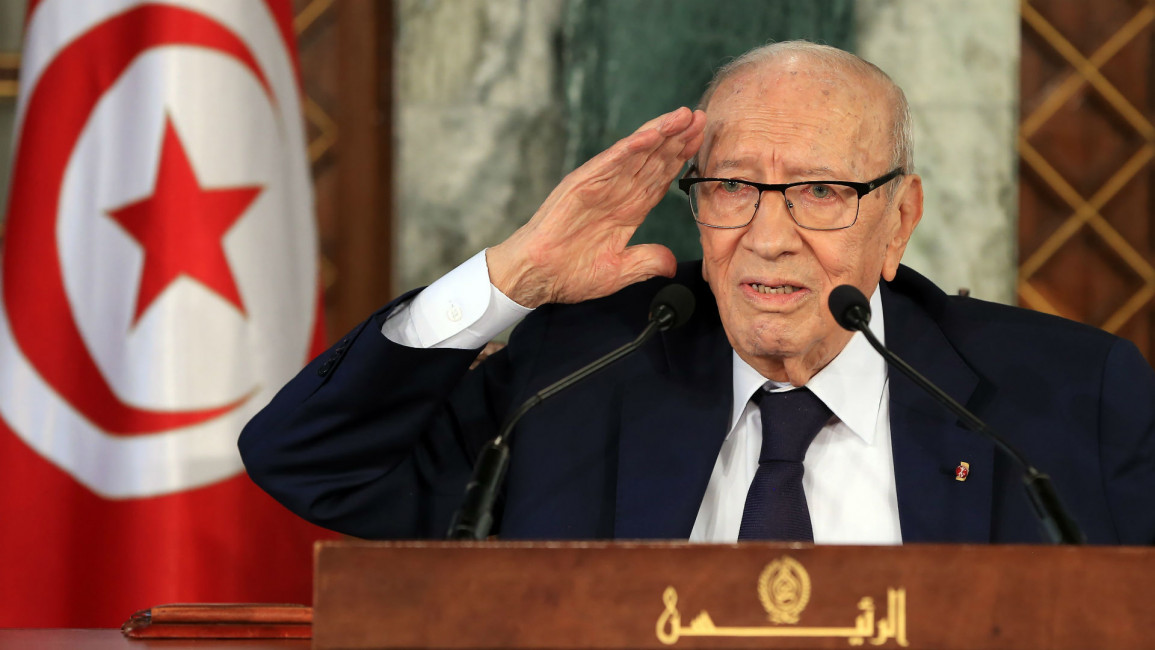Tunisia brings forward elections following President Essebi's death
Interim leader Mohammed Ennaceur "has 90 days to organise a presidential election" under the North African country's constitution, commission head Nabil Baffoun told AFP.
That means the poll must be held by 23 October.
Parliamentary elections had previously been set for 6 October.
"The question of whether the presidential elections will be organised before or after the parliamentary elections will be decided by the commission," Baffoun added.
The announcement comes amid a debate over the conditions for standing in the elections, which were amended in June but never approved or rejected by Essebsi.
The new code would bar several strong candidates from the poll, including media magnate Nabil Karoui, charged with money laundering this month after he stated his intention to stand.
Tunisia, the birthplace of the Arab Spring revolts, is the only country affected by the uprisings to have pushed through democratic reforms - despite political unrest, a sluggish economy and terrorist attacks.
The announcement came just hours after the death of Essebsi, the first democratically-elected president of Tunisia, who was hospitalised with a severe illness in late June and returned to intensive care on Thursday before he died.
Controversy and reforms
Essebsi came to power in 2014 as the leader and founder of the Nidaa Tounes party, three years after revolts were sparked across the Arab World - starting in Tunisia.
The late president was a prominent figure in the regime of Zine El Abidine Ben Ali.
Essebsi also served as foreign minister under state founder Habib Bourguiba before later changing allegiance to Ben Ali, whom he seved as parliamentary speaker and a number of positions linked to the country's feared security services.
Following the dictator's overthrow in 2011 he became prime minister, before being elected as president, and became one of the towering figures in post-revolution Tunisia.
As president, and in stark contrast to Ben Ali, Essebsi had much more limited powers due to newly-instated constitution guaranteeing democratic freedoms. It saw him relinquish day-to-day governing to his prime minister.
While President Essebsi was only responsible for foreign and defence policies during his time as leader, he was head of state during a number of important reforms for Tunisia and the wider region.
In 2018, the Tunisian president celebrated Women’s Day by announcing his intentions to submit a bill to parliament to grant women equal inheritance rights, despite protests from some conservatives.
Essebsi's announcement came after the publication of a report by Tunisia's Commission of Individual Liberties and Equality (COLIBE), which proposes, among other things, the legalisation of homosexuality and making the sexes equal in inheritance matters.
Essebsi said that decriminalisting homosexuality and abolishing the death penalty would be debated neither of which were followed through. LGBT campaigners have complained that gay men and women continue to face harrassment and intimidation from police and the legal system.
Essebsi was president when a law was scrapped that prohibited Tunisian Muslim women from marrying non-Muslim men, in what was seen as a significant step in loosening the tight controls over women's life choices.
The government has also visibly taken steps to address the country's epidemic of gender-based violence, passing a landmark law in July 2018 which meant that rapists could no longer escape punishment by marrying their victims.
Tunisia, whose 2011 revolt toppled longtime dictator Ben Ali and sparked the Arab Spring uprisings, has been hailed as a model of democratisation in the Arab world.
Under Essebsi, the government has been accused of attempting "counter-revolutionary measures", while economic woes and jihadist attacks have destabalised the country.
Prior to this death Essebsi followed the UK’s Queen Elizabeth II and Malaysia’s Tun Mahathir Mohamad as the third oldest world leader.
Essebsi leaves behind his wife and four children.
Follow us on Twitter: @The_NewArab


![President Pezeshkian has denounced Israel's attacks on Lebanon [Getty]](/sites/default/files/styles/image_684x385/public/2173482924.jpeg?h=a5f2f23a&itok=q3evVtko)



 Follow the Middle East's top stories in English at The New Arab on Google News
Follow the Middle East's top stories in English at The New Arab on Google News


